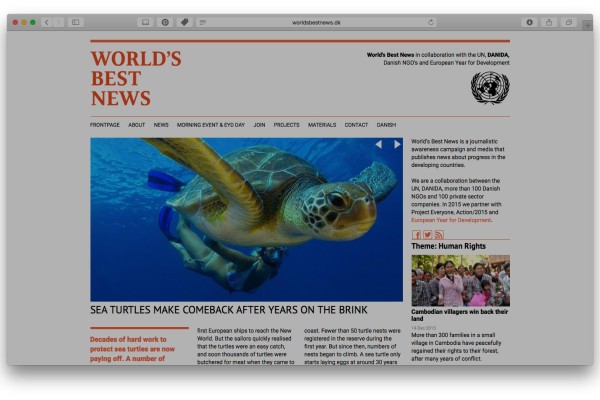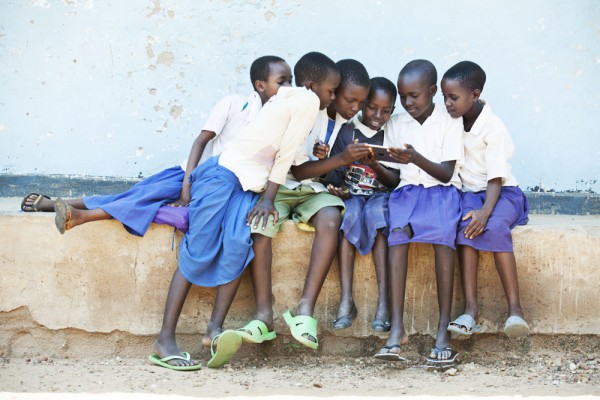This website uses cookies so that we can provide you with the best user experience possible. Cookie information is stored in your browser and performs functions such as recognising you when you return to our website and helping our team to understand which sections of the website you find most interesting and useful.
Danish solar WI-FI connects developing countries
Danish company provides cheap solar-powered Internet access to the world’s poorest people. The ability to go online increases growth by up to 30 percent – and BLUETOWN profits from it.
Summary, POLITIKEN (Danish media)
“When a village in Africa becomes connected to the Internet, the farmers can get the information needed to get the best price for their crops. They don’t have to take middlemen into account and they can cultivate their lands in the most efficient manner. Therefore, cheap access to the Internet means that a village’s economy will grow by up to 30 percent”, says Peter Ib, CEO of BLUETOWN, a Danish IT company with expertise in cheap Wi-Fi solutions in Africa, India and South America.
“Moreover, cheap internet access is also key for the teachers in the village as it ensures them access to knowledge and information. The same goes for the healthcare personnel that operates in sparsely populated areas”.
BLUETOWN is a Danish IT company with 70 employees that makes targeted efforts to become a global market leader in Wi-Fi solutions to developing countries – thereby connecting people in poor and rural areas by providing Internet access.
The essence of BLUETOWN’s solution is a 20-meter high online tower that provides Internet access through a Wi-Fi signal with a compass of up to one kilometer. Enough to cover an entire village, according to Peter Ib.
The Wi-Fi signal is powered by solar cells. At night when the sun doesn’t shine, the signal runs on incorporated batteries that are recharged during the day. In this way, BLUETOWN has secured an independent solution that doesn’t rely on external energy sources.
Why don’t BLUETOWN just use 3G or 4G technology?
“Wi-Fi is much cheaper. It costs around one tenth of the price for 3G and 4G. In addition, Wi-Fi is far less energy intensive. A 3G or 4G base station requires a large generator fuelled by gasoline or diesel in order to function”, says Peter Ib.
Peter Ib points out that BLUETOWN is working in close cooperation with the telecommunications companies as they often provide the internet connection, which BLUETOWN’s base stations are connected to. In other cases, the base stations connect through satellite links or fiber networks. In the future, it might be through balloons or drones.
The heart of BLUETOWN’s business model is to provide a low-cost Wi-Fi solution to the poorest areas of the world, countries like Tanzania, Ghana and India, in order to connect people and create wealth.
“It is a challenge that the people living in these areas don’t have a lot of money. However, if people are willing to pay a very low price for our service, we can grow a very good business”, states Peter Ib.
BLUETOWN has developed its base stations in order for them to manage the harsh conditions of the rural areas. Likewise, they require a minimum of maintenance.
“The base stations, the Wi-Fi transmitters, the solar cells and the batteries are designed to manage harsh conditions as this is crucial”, says Peter Ib.
Furthermore, it’s important that BLUETOWN knows how to navigate in the developing countries’ political systems and understand the reality for the people living in the villages.
“We need permission to operate from the local authorities. At the same time, we must ensure that the villagers take proper care of our equipment. This requires local acceptance of our solution – otherwise we risk that batteries are stolen and used to something else. Finally, we have to settle for a model that we profit from”, Peter Ib explains.
The answer is to enter into partnerships with the villagers.
“We rent land for the base station from the local headman. Thereby, he will have an interest in taking care of it. Then we hire micro operators who teach and help the villagers to use Wi-Fi, sell internet scratch cards and maintain the base station”.
Peter Ib emphasizes that the small amount of maintenance is important: “If the solar collectors aren’t polished every third day, they will become dusty and not able to recharge properly. Then the batteries will stop working and the Wi-Fi connection will disappear”.
In order to prevent this, BLUETOWN monitors every base station and contacts the local operator if they detect problems.
The Confederation of Danish Industry commends BLUETOWN
CEO Karsten Dybvad of DI, the Confederation of Danish Industry, is thrilled by BLUETOWN’s solution:
“When Danish industries form partnerships and establish ourselves in local communities, we contribute with growth and employment. Danish companies are specialized in solutions that provide clean water, food, renewable energy and energy efficiency – and communication, which BLUETOWN is a great example of.”
According to Peter Ib, DI’s Africa Team and the Danish Foreign Service have been a great help in the development of BLUETOWN:
“It has been absolutely vital that we have been able to get assistance from the merchants at the embassies in Tanzania, Ghana and India where we first began our business.”
Peter Ib expects that BLUETOWN will have more than a thousand employees within five years.
Source/POLITIKEN by Thomas Færgermann



